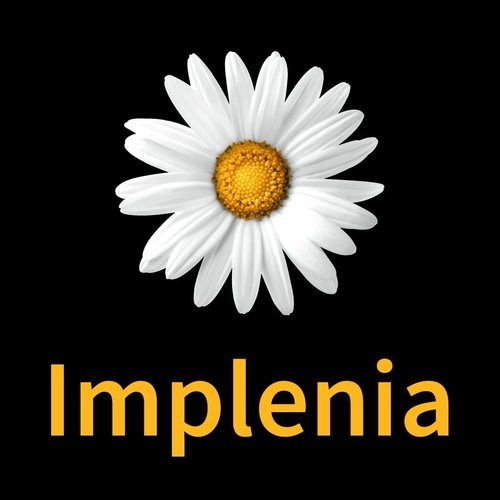
Sustainable construction
Sustainable products and services
Implenia looks for sustainable solutions when working on real estate and infrastructure projects. It can do this most effectively when it develops real estate projects on its own land, or when it is commissioned to act as developer. Beyond this, Implenia requires its business partners to operate sustainably and is actively committed to sustainable construction standards.
Content
Sustainability standards
Many different sustainability standards are applied to building construction. Labels such as SNBS, LEED, DGNB, BREEAM and Minergie set different requirements and focus on different aspects. Implenia Buildings had around 55 building construction projects with sustainability certificates under way in Switzerland and Germany in 2024. This is about twice as many as ten years ago. An average of 15 projects have been awarded a certificate every year since 2020. In 2024, Division Buildings (excluding Wincasa) generated more or less half its revenue from certified building construction projects. This share has been stable in recent years.
As well as its great experience in implementing sustainability standards, Implenia has also helped develop and harmonise several of them. It worked, for example, as a founding member on the development of the “Swiss Sustainable Construction Standard” (SNBS, see below). One of the goals that Implenia set itself for end-2025 is to develop and execute projects according to the highest sustainability standards, as well as to participate in the further development of these standards. Consequently, Division Real Estate decided to carry out all its development projects in Switzerland according to the SNBS standard, irrespective of the client. In Germany Division Real Estate follows the DGNB standard. The development and project portfolio thus meets high sustainability requirements.
Implenia is a founding and sponsoring member of the network, and has had a place on its board since 2012. At the end of 2023, Implenia extended its sponsoring membership for a further three years until the end of 2026. In Germany Implenia has been a member of the ESG Circle of Real Estate (ECORE) since 2023. 2024 saw the first building sites awarded the “Sustainable Construction Site” certificate devised by the German Sustainable Building Society.
For civil engineering work in Switzerland, Implenia also uses SNBS sustainability criteria in its infrastructure tenders. In Norway and Sweden, Division Civil Engineering is gaining initial experience with the BREEAM Infrastructure Label (formerly CEEQUAL). Two projects in Sweden, “Hagalund” and “Londonviadukten” achieved BREEAM Infrastructure ratings at the “Excellent” level. In Germany, the German Society for Sustainable Building (DGNB) has developed a certificate for sustainable construction sites for special foundations in consultation with Implenia.
Sustainability certificates in building construction
in number of projects in realisation
CONSULTANCY SERVICES IN SUSTAINABLE CONSTRUCTION
Even in the very early stages of projects Implenia addresses various aspects of sustainability and discusses these with the client.
Government clients often demand high sustainability standards for large-scale infrastructure projects. Implenia, with all its experience in this field, is committed not just to meeting these requirements, but to exceeding them – in order to compete effectively and increase its market advantage.
If Implenia is mandated to build something for a customer, as full-service provider, general or total contractor, it cannot always influence the sustainability of the project. Nevertheless, our experts look for opportunities to introduce sustainability concepts that exceed the specifications.
To this end, Implenia first evaluates the customer’s sustainability strategy and objectives. Our specialists then develop a specific sustainability concept for the construction project. In this way, Implenia sometimes manages to incorporate sustainability aspects even if the client didn’t originally plan them. A successful example of this was a project we carried out for an international organisation in Geneva. Implenia aims to extend this active approach systematically across the Group in 2025.
Under the Encira brand, Implenia has been offering services in the fields of building physics, acoustics, sustainability and energy since 2024. Encira uses interdisciplinary approaches and tools to examine new-build and reconstruction projects and to develop holistic solutions in these fields.
Encira experts analyse the grey energy of buildings, for example, and calculate their greenhouse gas emissions. Encira helps construction projects across all phases to achieve their sustainability goals – with sustainability certifications, circular economy concepts, life cycle analyses and climate risk assessments.
Encira also develops strategies for energy efficiency and operational optimisation and offers energy consultancy services for local authorities and SMEs in Switzerland (read more).
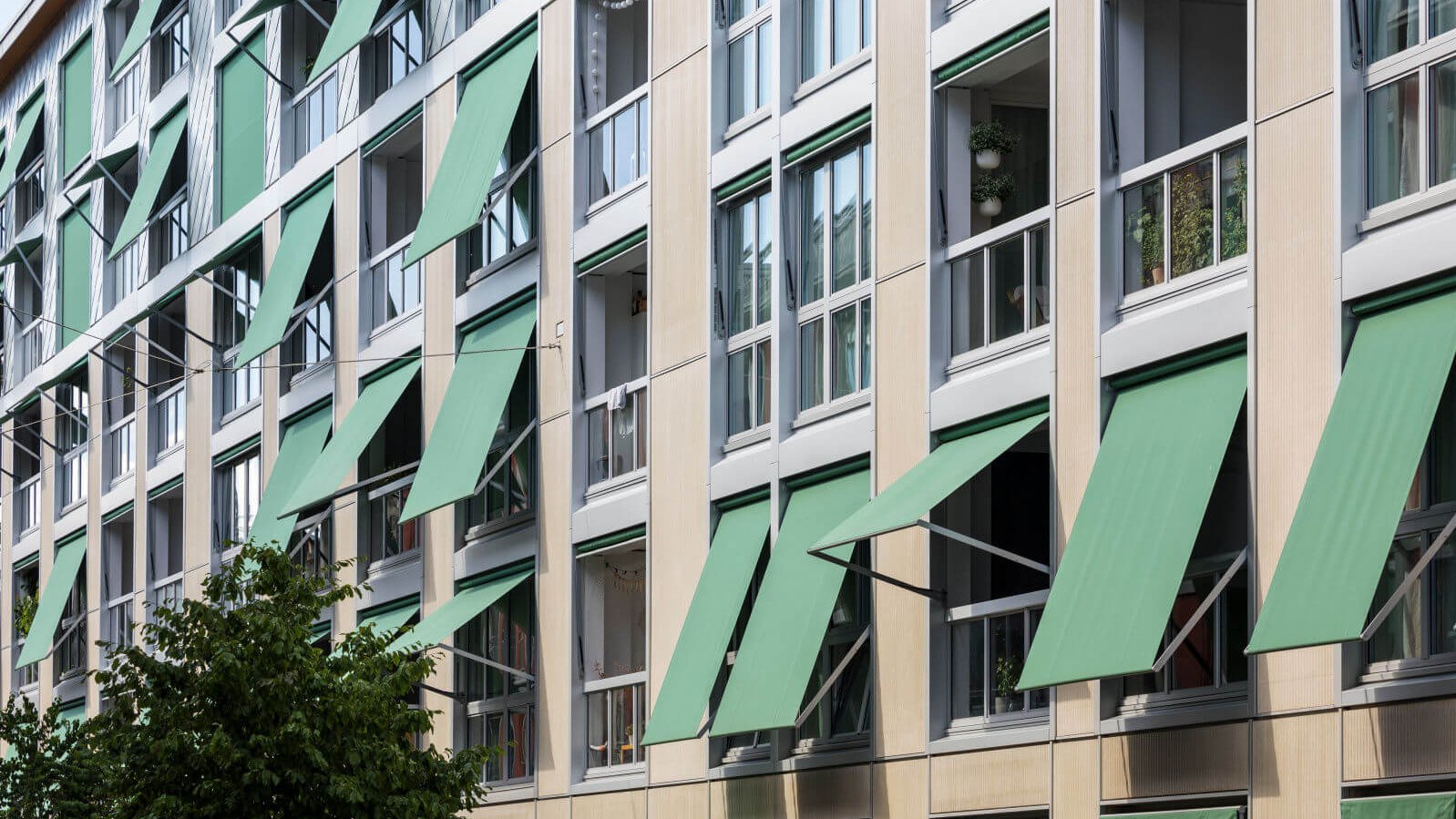
Developing our own projects
Division Real Estate’s decarbonisation strategy in Switzerland
In 2022, Implenia Real Estate analysed its entire portfolio of more than 40 development projects in Switzerland and calculated its CO2 footprint. The analysis was carried out on the basis of the SIA energy efficiency path (date sheet 2040). With one exception, all the buildings are new-builds, and half of them are wooden or wood-hybrid constructions. There was a focus on using non-renewable energies and on CO2 emissions. SIA 2040 covers three areas – construction, operation and mobility – taking into account the entire life cycle of a property from its creation to its use, including possible replacement investments during operation, and right through to the end of its life.
The extensive analysis showed that the planned office buildings in the portfolio would on average meet the SIA 2040 target. Potential improvements have been identified in the residential buildings portfolio, particularly in terms of the actual structures. Optimisations have been initiated in specific projects in order to reduce greenhouse gas emissions.
The portfolio analysis has enabled Division Real Estate to identify key levers for minimising greenhouse gas emissions and define an ambitious decarbonisation strategy, taking into account the 1.5 degree target set by the Paris Climate Agreement. Real Estate (Switzerland) has undertaken to reduce operational emissions from all new-builds in its development portfolio to net-zero by 2030. Implenia’s target for existing buildings is net zero by 2050.
Emissions from construction processes and materials will be gradually reduced in all new building development projects by 2040. From 2040 at the latest, there should be net zero emissions over the entire lifecycle of new construction projects undertaken by Real Estate (Switzerland).
In order to achieve these goals, Real Estate assigns a carbon budget to each project at the start of SIA phase 2 (preliminary studies). This sets a limit for the subsequent development, construction and operational phases. The entire process is monitored so that optimisations can be identified and implemented at an early stage.
An ambitious decarbonisation strategy presents various challenges in terms of design, choice of materials and technical systems. Implenia has learned that the earlier and more consistently climate change standards are incorporated into project development, the lower the possible additional costs of the project. In the long term, Implenia is aiming for regenerative buildings that not only produce fewer emissions, but even make a positive ecological and social contribution.
Implenia published a white paper on decarbonising buildings in 2023 in order to make the topic more understandable and accessible. This describes key strategies and levers, and also serves as a guide for building owners, managers and planners to drive the issue forward in their projects (read more).
Implenia Real Estate: CO2 limit values for development buildings using the example of residential buildings (new buildings, Switzerland)
in kg CO2/m2a
Social Real Estate
In the face of increasing urbanisation and population density, the built environment must take greater account of current and future social needs. This applies not just to physical aspects, but also to operational and organisational factors, as well as to the way these are perceived. All of this is crucial to achieving social sustainability in the real estate industry.
Implenia, together with Wincasa, published the brochure “Real Estate: Driver of social dynamics" in 2024. This highlights the social demands placed on the built environment. Based on extensive research and interviews with experts in social sustainability, it defines nine goals and 33 accompanying measures that could help ensure buildings, sites and cities are better at meeting social needs.
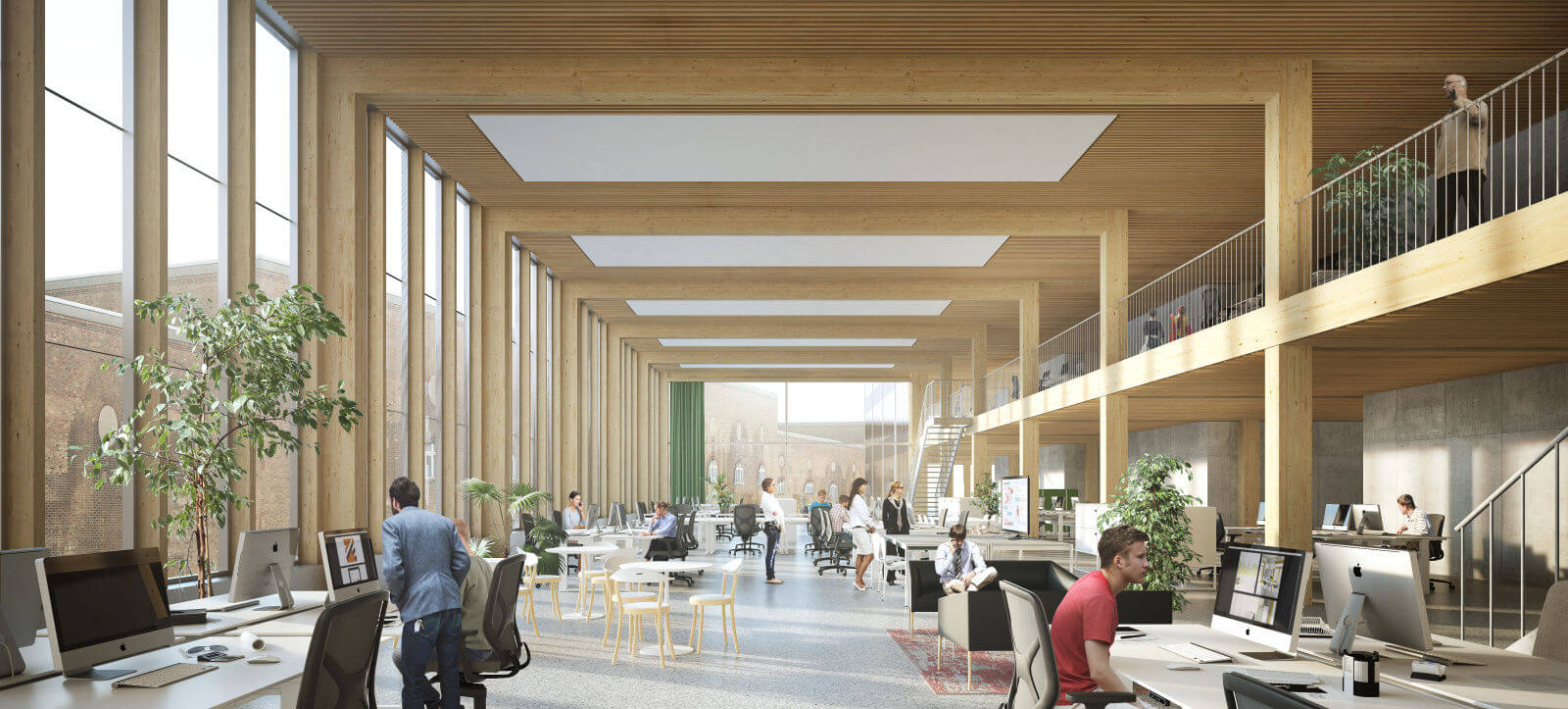
Sustainable building management
Wincasa, Switzerland’s leading property service provider, has been part of Implenia since 2023. Wincasa’s business activities are focused on real estate management. In addition, Wincasa supports its customers with a wide range of services for all phases of a property’s life. Sustainability is a key priority.
Sustainable building management has to start with the careful collection of environmental data using a professional ESG data management system. Wincasa, working with a partner company, has developed a practical platform that integrates all the relevant steps, from initial data acquisition and plausibility checks to the reporting of energy data. This provides a suitable basis for, among other things, Global Real Estate Sustainability Benchmark (GRESB) assessments. In 2024 Wincasa also started offering support for BREEAM in-use certification, including auditing by qualified experts.
When tendering for and renegotiating strategic facility management (FM) contracts, Wincasa included biodiversity issues alongside existing guidelines for sustainable operations. In 2024, various owners implemented targeted measures at their properties to promote biodiversity.
The new Papilio Property Solutions service, developed with UBS, helps owners of investment properties with the sustainable optimisation of their properties. Standardised building surveys and status analyses are used to identify potential improvements and propose targeted measures that can help reduce energy consumption and greenhouse gas emissions.
Building with timber
In recent years, Implenia has systematically expanded its already extensive expertise in sustainable techniques and materials. Timber construction in particular has been in the vanguard of innovation. Thanks to new building methods and its low grey energy content, wood has been enjoying a renaissance as a natural construction material for some years now. At Implenia, timber construction is characterised by seamless collaboration between engineering and project execution units based on coordinated processes. Clients appreciate this integrative approach as it enables the engineering team to make early optimisations during the development phase – which is crucial when executing sustainable projects.
If the raw material is purchased locally, buildings made of wood cause significantly less greenhouse gas emissions than conventional buildings made of concrete or brick. Wood is not only climate-friendly, but is also ideal for prefabricating building elements. Another advantage of modular construction is that these elements can be used flexibly and are easy to replace or dismantle. In order to cope with growing demand, Implenia runs a wooden construction facility in Rümlang, Canton Zurich.
In the projects it develops itself, Implenia uses wood and wooden materials that carry an FSC, PEFC or equivalent label. Implenia uses offcuts to fuel a central heating system, which also supplies heat to the adjacent yard. Having planned and executed groundbreaking projects such as Rocket in Winterthur and Pi in Zug (read more), Implenia is a leading player in Switzerland’s timber construction segment.
Innovative solutions
- GRI 308-2
New insights, digitalisation and technological progress are profoundly changing the construction and real estate industry. Implenia is harnessing these changes to benefit its clients, employees and shareholders. “Innovation” is one of the company’s four strategic priorities. Implenia innovates to achieve profitable growth by adding value for clients and users looking to satisfy their modern living, working and mobility requirements. Implenia focuses on three key innovation goals:
- Develop and scale new business models: Implenia is committed to exploring and leveraging new business segments to facilitate long-term positioning in strategic growth areas.
- Accelerating the adoption of new technologies: Implenia focuses on the rapid validation and integration of new technologies to increase efficiency and competitiveness.
- Improve and standardise the business: Implenia strives to optimise and standardise existing processes to ensure quality and performance on a large scale.
Implenia uses intrapreneurship and open innovation activities to achieve these goals. Specifically, innovation is progressed through three key programmes:
- Partnerships and investments:
- Portfolio management and value creation through investing in strategic innovation projects and start-up collaborations
- Strong partnerships in “Opportunity Spaces” that promote new business models and technologies in the divisions
- Start-up scouting and validation:
- Exploration and validation of start-ups and technology solutions
- Introducing new technologies, improving and industrialising existing business
- Intrapreneurship programmes:
- KICKBOX programme
- Innovation training and workshops
- Events and community development
The Implenia internal Innovation Hub has been coordinating these bottom-up and top-down activities, and the alignment of the Divisions, since 2019. Various new, innovative offerings and products have been developed and tested in all Implenia Divisions. The following overview provides an insight into selected examples.
Examples of innovative solutions
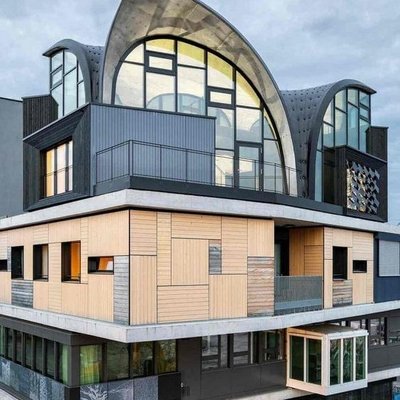
«Beyond Zero» commitment
NEST is the modular research and innovation building run by the two Swiss research institutes Empa and Eawag. It is located in Dübendorf near Zurich. More than 150 research, business and public sector partners work closely together at NEST. NEST’s “Beyond Zero” unit tests promising low CO2 and CO2-negative innovations in the building sector, and highlights how buildings can act as carbon sinks. The unit tests novel building materials developed by Empa, such as concrete and insulation materials that bind carbon. Implenia supports the project as a realisation partner.

Wood composite flat ceiling
Implenia worked with WaltGalmarini and ETH Zurich to develop an innovative wood-composite flat ceiling. This uses materials whose properties combine to form an efficient ceiling system. The wood composite flat slabs do the same job as traditional concrete slabs or solid/composite timber solutions, but with a significantly lower environmental impact.
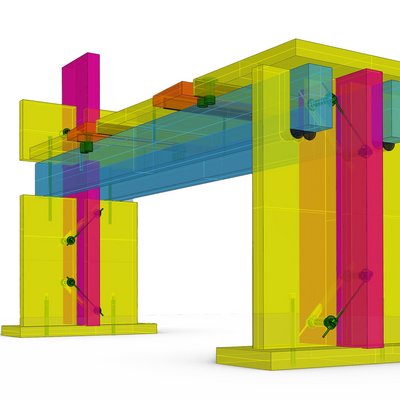
Reusing concrete elements
As part of its partnership with the Circular Building Industry Booster, the Implenia Innovation Hub helped the “Concrete Structural Reusability” project at the ZHAW University of Applied Sciences to create its prototype. Practical experience of recovering, reusing and integrating concrete elements flows back into the research project; once the study is completed it will be made available as an open source document to the whole Swiss construction industry.
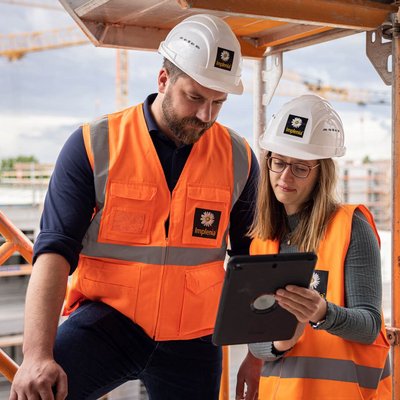
Reusing building materials
In 2024, Implenia’s civil engineering unit tested a materials exchange system in German-speaking Switzerland in attempt to reduce waste. The resulting ReUse app will allow all Implenia employees to access this marketplace for used materials from 2025 onwards: ads can be posted, materials can be searched and search profiles created.
Supplier management
- GRI 2-6
- GRI 2-23
- GRI 2-2
- GRI 2-24
- GRI 2-25
- GRI 3-3
- GRI 308-1
- GRI 308-2
- GRI 414-1
- GRI 414-2
Implenia purchases a large volume of steel, concrete and other building materials for its projects, as well as buying in external services. More than 98 percent of our business partners are located in the EU and Switzerland.
The company uses a professional supplier management system to minimise risks in its extended value chain. Suppliers and subcontractors go through a multi-step process that forms the basis for a long-term working relationship. This includes due diligence checks, (re-)qualifications, annual assessments and audits, plus other supplier development measures.
All business partners must meet clearly defined minimum requirements in the following areas:
- Environment
- Working conditions
- Health and safety at work
- Compliance
- Procurement
- Quality
- Financial performance
In the medium term, Implenia plans to work exclusively with sustainability-oriented companies. It has set itself a goal for the end of 2025 of awarding at least 75 percent of contracts by value to business partners that have been evaluated according to sustainability criteria and that meet higher standards. To this end, Implenia adopted a group-wide procurement directive at the end of 2024.
The new Supplier Relationship Management System (SRM) allows a comprehensive assessment of each supplier’s sustainability performance. Implenia is currently collecting data for the Sustainability Index and training its employees to use this in the procurement process. The index is based on a survey about various sustainability aspects, such as environmental management and working conditions. Internal project evaluations and empirical values are also considered in the assessment. If the supplier achieves a predefined score in the index, it is classified as sustainable. So far, Implenia has been able to evaluate a large proportion of its suppliers in Switzerland, Germany, Sweden and Norway in terms of the award sum.
Supplier audits were also conducted in the same countries in 2024, while joint venture assessments were carried out in Austria, Italy and France.
Risk analysis as defined in the Supply Chain Due Diligence Act, which has been in force for Implenia in Germany since the beginning of 2024, is also covered by the new SRM system. This means that Implenia always has up-to-date information on its business partners in Germany and Switzerland, where about 95 percent of these partners are based.
Implenia adheres to the International Labour Organization (ILO) Declaration on Fundamental Principles and Rights at Work and its follow-up declaration; it is committed to respecting internationally recognised human rights and to reflecting this commitment in its business activities and along the value chain. More on this in the Human Rights chapter.
